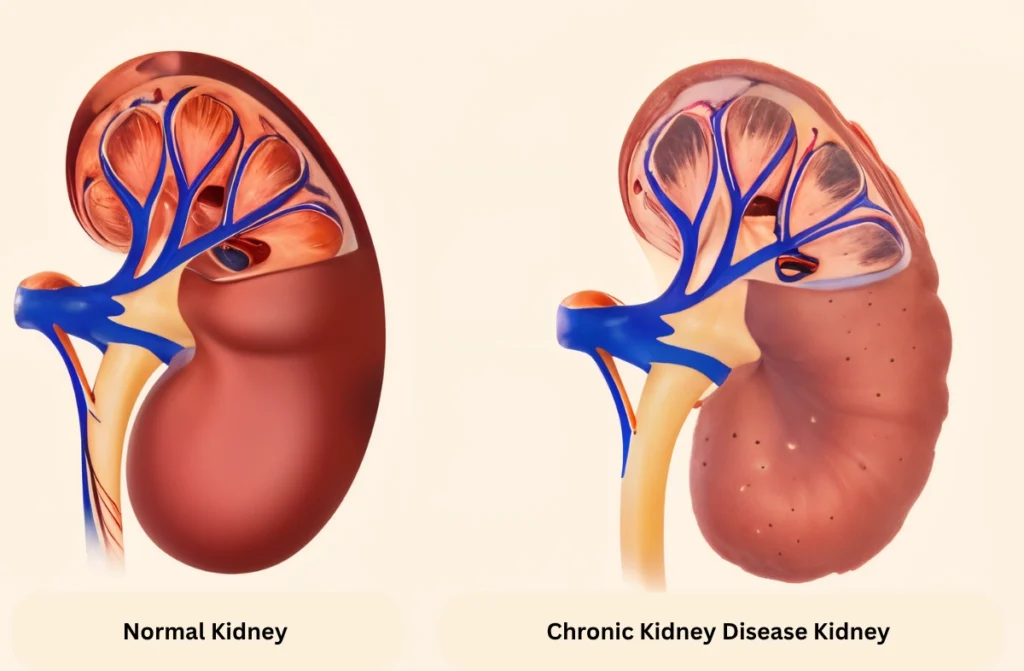How to prevent kidney failure is a common question for those concerned about kidney health. Kidney failure occurs when the kidneys lose their ability to filter waste and excess fluids from the body. Fortunately, there are steps you can take to lower your risk. With the right lifestyle changes, early detection, and proper management, you can prevent kidney failure and maintain healthy kidneys.
What is Kidney Failure?
Kidney failure occurs when the kidneys lose their ability to filter waste and excess fluids from the blood, leading to toxin buildup in the body. It can result from conditions like diabetes, high blood pressure, or infections. Early signs of kidney failure include swelling, fatigue, and changes in urination. Timely treatment is crucial in preventing chronic kidney disease.

How to Prevent Kidney Failure?
1. Stay Hydrated to Maintain Kidney Function
Drinking enough water is essential for flushing out toxins and preventing kidney damage. Dehydration can put stress on the kidneys, leading to long-term complications.
Tips to Stay Hydrated:
- Drink at least 8–10 glasses of water daily
- Consume water-rich fruits like watermelon and oranges
- Reduce intake of sugary and caffeinated drinks
Proper hydration is a key step in how to prevent kidney failure, as it supports kidney function and prevents kidney stone formation.
2. Maintain a Balanced Diet for Kidney Health
A nutritious diet helps in preventing chronic kidney disease by reducing the strain on the kidneys. Certain foods promote kidney health, while others increase the risk of damage.
Best Foods for Kidney Health:
- Leafy greens, berries, and apples
- Lean proteins like fish and eggs
- Low-sodium and potassium-rich foods
Avoid excessive salt, processed foods, and sugary drinks as they contribute to kidney stress. Following a balanced diet is a crucial factor in how to prevent kidney disease.
3. Monitor Blood Pressure Regularly
High blood pressure is a major contributing factor to kidney failure.
Ways to Control Blood Pressure:
- Reduce salt intake
- Exercise regularly
- Manage stress through meditation or yoga
Since hypertension can be a warning sign of kidney problems, it’s important to monitor blood pressure levels and take necessary precautions.
4. Manage Blood Sugar Levels
Diabetes is a significant risk factor for kidney failure. Uncontrolled blood sugar damages the tiny blood vessels in the kidneys, leading to reduced function.
Diabetes Management Tips:
- Maintain a low-carb, high-fiber diet
- Monitor blood sugar levels regularly
- Take prescribed medications on time
Keeping blood sugar under control is one of the most effective ways in preventing chronic kidney disease.
5. Exercise Regularly for Better Kidney Function
Regular physical activity helps regulate blood pressure, blood sugar, and cholesterol levels, all of which contribute to kidney health.
Best Exercises for Kidney Health:
- Walking, jogging, or swimming
- Strength training in moderation
- Yoga and stretching exercises
Exercise not only supports overall health but also reduces the risk factors associated with how to prevent kidney failure.
6. Avoid Overuse of Painkillers and Medications
Prolonged use of nonsteroidal anti-inflammatory drugs (NSAIDs), such as ibuprofen, may damage the kidneys.
Safe Medication Practices:
- Use painkillers only when necessary
- Consult a doctor for safer alternatives
- Avoid self-medication and over-the-counter drugs
Reducing unnecessary medication intake is an important step in how to prevent kidney disease and maintain long-term kidney function.
7. Quit Smoking and Limit Alcohol Consumption
Smoking and excessive alcohol intake damage kidney blood vessels, reducing their ability to filter waste effectively.
Healthy Lifestyle Changes:
- Quit smoking with support from counseling or nicotine therapy
- Keep alcohol consumption moderate — up to 1 drink per day for women and up to 2 for men.
- Replace harmful habits with healthy alternatives like herbal tea or meditation
Since smoking is linked to several health complications, including signs of kidney failure, quitting is crucial for kidney health.
8. Get Regular Health Check-ups
Routine screenings help detect early warning signs of kidney problems before they progress into severe conditions.
Important Tests for Kidney Health:
- Blood pressure monitoring
- Urine analysis for protein levels
- Blood tests to check creatinine and GFR (glomerular filtration rate)
Early diagnosis plays a major role in preventing chronic kidney disease, allowing timely medical intervention.
9. Reduce Salt and Processed Food Intake
Excess sodium increases blood pressure and strains the kidneys, leading to long-term damage.
How to Reduce Sodium in Diet:
- Choose fresh, home-cooked meals over packaged foods
- Use herbs and spices instead of salt
- Check food labels for sodium content
Following a low-sodium diet is essential in how to prevent kidney failure, as it reduces stress on the kidneys.
10. Recognize Early Signs of Kidney Failure
Early detection of kidney issues can help in timely intervention and prevention of complications.
Common Warning Signs of Kidney Problems:
- Persistent fatigue and weakness
- Swelling in feet, hands, or face
- Changes in urination (frequent, foamy, or bloody urine)
Identifying signs of kidney failure early can help take the right preventive steps, ensuring long-term kidney health.
How to Prevent Kidney Diseases
Learning How to prevent kidney disease involves making lifestyle changes that focus on maintaining healthy kidneys. Aside from eating a balanced diet and exercising regularly, it’s crucial to stay hydrated. Drinking plenty of water helps your kidneys flush out toxins and waste products. Avoiding overuse of medications like NSAIDs, which can damage kidneys over time, is also important.
Proactively managing health conditions like diabetes and high blood pressure can prevent kidney disease from developing and is an essential part of learning how to prevent kidney failure. If you have risk factors, be diligent in monitoring your kidney health and follow the advice of your healthcare provider. Knowing how to prevent kidney disease empowers you to take control of your kidney health and minimize the risk of complications.
Kidney Failure Signs
- Fatigue
- Persistent tiredness and lack of energy
- Swollen Ankles or Feet
- Noticeable swelling due to fluid retention
- Difficulty Concentrating
- Trouble focusing or thinking clearly
- Changes in Urine Output
- Variations in frequency, color, or volume
Warning Signs of the Kidney Problems
Warning signs of kidney problems may include persistent back pain, high blood pressure, or blood in the urine. Early detection is critical to preventing kidney failure, so don’t ignore these warning signs. If you suspect any kidney issues, consult a healthcare provider promptly to discuss your symptoms and get the necessary tests.
Proactive care and timely medical interventions can help prevent kidney damage from worsening, giving you a better chance at preserving kidney function. Recognizing the warning signs of kidney problems will help you take immediate action and avoid potential kidney failure.
Conclusion
How to prevent kidney failure is a question with an answer rooted in healthy habits and regular monitoring. By eating a kidney-friendly diet, exercising regularly, controlling blood pressure, and avoiding unhealthy habits, you can protect your kidneys from damage.
Remember that early detection of kidney disease and consistent monitoring of kidney health are key to preventing kidney failure. If you have risk factors or a family history of kidney disease, consult your doctor for guidance on preventing kidney failure.




